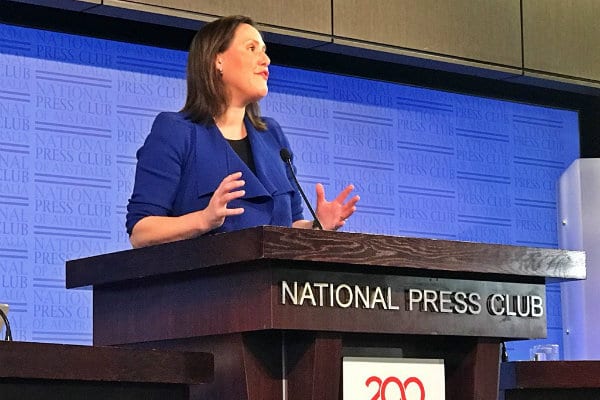Minister for Women Kelly O’Dwyer has today released the Women’s Economic Security Statement and the Coalition Government’s plans to spend $109 million over four years to support women’s economic empowerment.
It’s a small pool of money, given the magnitude of the three areas it aims to address: workforce participation, earning potential and economic independence.
But it’s a good start and meets the ‘seperate women’s statement’ initiative promised in the 2019/19 Federal Budget.
Leaving aside some of the small token-like measures, such as scholarships for women in finance and a vague push to promote female entrepreneurs, this statement includes kickstarting some programs that could be greatly beneficial for improving policy-making on women’s economic security areas later on, and offer long-overdue financial security measures for women escaping family violence.
The stronger parts of the statement include the reinstatement of the Australian Bureau of Statistics Time Use Survey, in that it will present essential data on how men and women are spending their time and — hopefully — enable policy makers to better quantify and address the economic value of unpaid labour being contributed. I’ve written previously about why it’s so important that we put a dollar value on such unpaid labour, given the mantra of Marilyn Waring that, “What we don’t count, counts for nothing”.
Other policies regarding women’s economic security will be meaningless if we don’t count the significant amount of unpaid work women are putting into caring and domestic responsibilities. This unpaid work is still the single largest sector of any nation’s economy, but Australia has failed to collect this data for decades, despite other countries including New Zealand, the US, and countries across Europe, Asia and Scandinavia continuing to do so.
Also strong and potentially life-changing for some women are measures to help prohibit the cross-examination of victims of family and domestic violence in “specific and serious circumstances” in court. The statement then outlines funding for family law property mediation and improvements to transparency on superannuation in property settlements, as well as continued support of the no-interest loan scheme through the Good Shepherd microfinance program.
Another aspect being widely promoted today from the Statement includes extending early superannuation access provisions to women who are victims of family and domestic violence, an “important last resort lifeline needed to begin the recovery process in a safe environment”. This measure comes in addition to the Coalition Government continuing to fund “Specialist Domestic Violence Units and health and Justice Partnerships”.
Paid Parental Leave
Also significant in today’s Statement are changes to Government-funded Paid Parental Leave (PLP) that will enable more flexibility for parents accessing the scheme, particularly for women running their own businesses. The policy, which would be adopted for babies born or adopted on or after 1 July 2020, will enable families to split their PLP period into blocks of leave, and take up to six weeks between 12 and 24 months (currently it must be taken within the first 12 months).
Still on PLP, current work test rules that say parents cant take more than an eight week break between two working days in ten of the 13 months prior to the birth will be amended to enable a 12 week break.
The Pay Gap
The Coalition has also provided $8 million in funding (announced last week) to the Workplace Gender Equality Agency to update its software and report on a wider number of employers, potentially increasing the percentage of employees covered from the current 40 per cent to 75 per cent.
Scholarships and other programs
Meanwhile, some of the smaller measures promised as part of the package include a pilot program called Career Revive to support women returning to work in regional Australia, as well as a ‘Reducing Barriers to Work Forum’ to discuss ways to close the ‘flexibility gap’ between men and women, and address the gender pay gap and identify practical measures to support women in returning to works.
There are also measures to encourage an early interest in STEM for girls, as well as a $3.6 million ‘Future Female Entrepreneurs’ program aimed at engaging 55,000 girls and young women in a digital platform and in-person workshops. There are also scholarships for women in economics and finance funded through the Women’s Leadership and Development Program.
********
It’s great to see the Minister for Women, who declares herself a feminist, releasing this statement and putting these issues on the table, finally. As she is expected to tell the National Press Club today: “When women do well, their families do well, and our economy and nation prospers.”
However, while spending $109 million over four years can greatly assist in kickstarting initiatives and funding particular programs — including, as mentioned above, the all important time-use survey — it’s a tiny amount given the stated ambitious goals.
The focus on addressing women’s safety is also welcome, but again the money allocated appears limited compared to the size of the problem.
The statement notes that “1.6 million Australian women” are affected by such violence, given 17 per cent of women have experienced violence from a current or former partner since the age of 15. This number is obviously significant. Offering the early release of superannuation is an interesting idea, but must really only be considered a last resort — and one that could be significantly detrimental to a woman’s retirement savings later on. Also, how many women have access to significant amounts of superannuation in the first place?
Meanwhile, measures to offer interest free loans to victims as well as better support in court are also necessary and long overdue. These are economic security measures — that fit with the economic security goals of this statement — but the prevalence of domestic and family violence in Australia simply mean the problem needs more significant funding at the Federal level.
This first statement marks a much-needed and long-awaited start from the Coalition Government. But $109 million over four years to tackle women’s economic security? To address the pay gap, the rising number of women retiring into poverty, to help women return to work and raise female workforce participation, to financially assist women escaping violence, and more? It is, unfortunately, not enough.
Below is a break down of the measures announced in the Women’s Economic Security Package, as provided by the Minister’s office.
Measures to increase women’s workforce participation ($54.8 million over four years):
- Reinstating the Time Use Survey, a contemporary evidence base to measure women’s economic security
- Improvements to Workplace Gender Equality Agency systems to enhance Australia’s gender equality data and reduce the cost of reporting for business
- Establishing the Reducing Barriers to Work Forum
- Increasing flexibility in the Paid Parental Leave system and extending access through changes to the work test
- Supporting regional employers through the Career Revive initiative to develop action plans for their business to attract and retain women returning to work after a career break
- Providing scholarships for women in economics and finance through the Women’s Leadership and Development Program
Measures to improve women’s earning potential ($18.6 million over four years):
An expansion of the Curious Minds program
- Establishing a Future Female Entrepreneurs program in partnership with the private sector
- Creating a new grants program, Boosting Female Founders, to ensure women can access the finance they need to achieve their entrepreneurial goals
Measures to support women’s economic independence ($35.6 million over four years):
- Providing Specialist Domestic Violence Units and Health Justice Partnerships, including for financial support services
- Extending early release of superannuation for victims of domestic and family violence
- Expanding the No Interest Loan Scheme run by Good Shepherd Microfinance to women experiencing family and domestic violence
- Funding legal assistance to ensure victims of family violence are protected from direct cross- examination by their perpetrators in family law matters
- Improving the visibility of superannuation assets in family law proceedings
- Providing family law property mediation
- Establishing a new Small Claims Property pilots program


